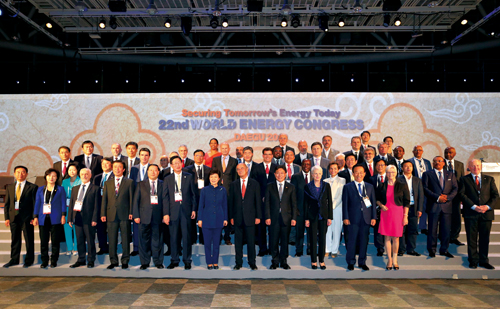
Global energy leaders from the government and the private sector from around the world including Korean
President Park Geun-hye participated in the 22nd World Energy Congress (WEC) Daegu 2013, which ended on Oct. 17.
The 22nd World Energy Congress (WEC) Daegu 2013, which attracted global energy leaders from the government and the private sector from around the world, wrapped up its five-day run on Oct. 17. The congress is seen as an opportunity to reconfirm Korea’s global standing in the global energy field.
_wec박대통령P.jpg)
President Park Geun-hye gives her speech at the WEC Daegu 2013.
Ministers from major energy producing nations, including Iraq, Russia, and Malaysia, as well as global energy leaders such as Royal Dutch Shell CEO Peter Voser; Saudi Aramco CEO Khalid Al-Falih; GDF-SUEZ Chairman & CEO Gerard Mestraliet; Rosneft President & Chairman Igor Sechin; and Westinghouse Electric Co. CEO Daniel Roderick descended on Daegu and participated in the WEC Daegu 2013 which took place from Oct. 13-17 under the theme “Securing Tomorrow’s Energy Today.”
_에너지총회02BX.jpg)
Korean and foreign energy leaders, including President Park Geun-hye and Korean Electric Power Corp.
President Cho Hwan-eik, concurrently chairman of the WEC Daegu 2013
Organizing Committee, at the opening ceremony of the WEC Daegu 2013.
The participating global energy leaders adopted the “Declaration of the 22nd World Energy Congress,” the first such statement in WEC history, signed by Korean Minister of Trade, Industry and Energy Yoon Sang-jick; Pierre Gadonneix, chairman of the World Energy Council; and Marie-Josee Nadeau, incoming chair of the World Energy Council. In the statement, the Korean government suggested its policies and vision on how to address global energy issues.
The statement called for countries to create an energy mix in their bid to ensure environmentally sustainable economic growth. It emphasized the need for the international community’s efforts to ensure good governance and safety and to integrate innovative energy technologies, including smart grids and energy storage systems.
“Energy leaders from the public and the private sectors have acknowledged the need for change amid the complexity and uncertainty of the fast-growing 21st century world. The world energy map is changing; we need to change to keep pace with new developments. As we search for solutions, we need to address the triple challenge of energy security, energy equity, and environmental sustainability, as identified by the World Energy Council as the Energy Trilemma,” the statement said.
_에너지총회03BY.jpg)
Korean Minister of Trade, Industry and Energy Yoon Sang-jick is flanked by Pierre Gadonneix, chairman of t
he World Energy Council, and Marie-Jose Nadeau, incoming chair of the World Energy Council, as they
issued the “Declaration of the 22nd World Energy Congress,” the first such statement in WEC history.
The congress held 63 sessions on energy issues related to oil, gas, nuclear and renewable energy sources. The participating global leaders concentrated on ways of finding solutions to the woes and problems associated with the Energy Trilemma.
Energy leaders touched on the need to strengthen energy security by revamping energy systems such as smart grid and ESS and establishing energy policies to promote safety and reliability.
On the energy equity issue, the statement said, “We agree that the vision of global energy as the foundation of sustainable growth can be achieved by expanding clean energy in advanced nations through technological breakthroughs and by ensuring equity through the expansion of infrastructure distribution in developing countries.”
The energy leaders stressed that the materialization of projects to link power, oil, and gas networks, which have the potential to promote energy cooperation in the Northeast Asian region, will have a positive impact toward the solving of the Energy Trilemma.
